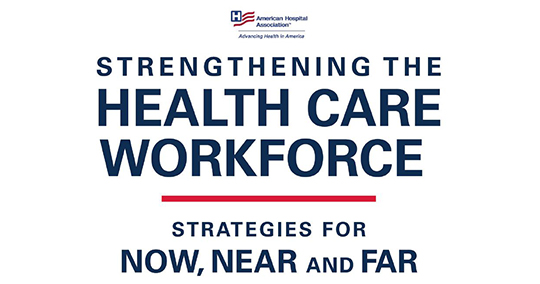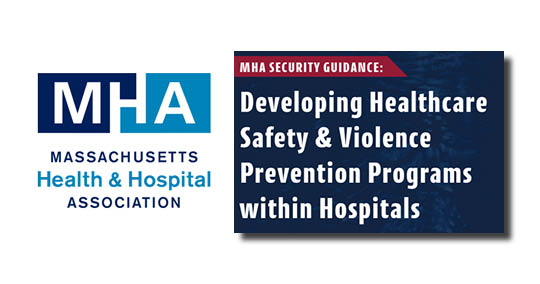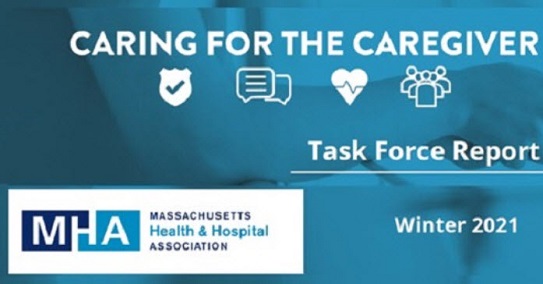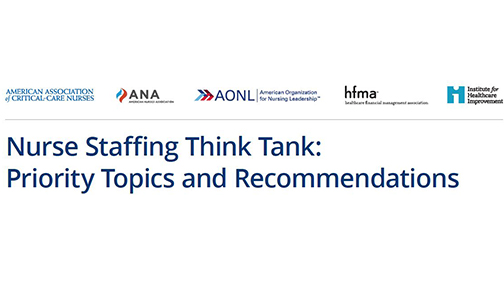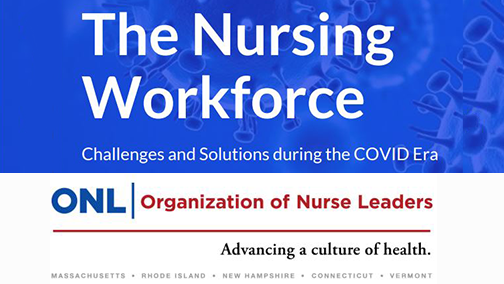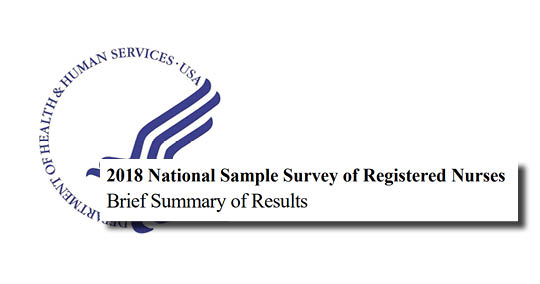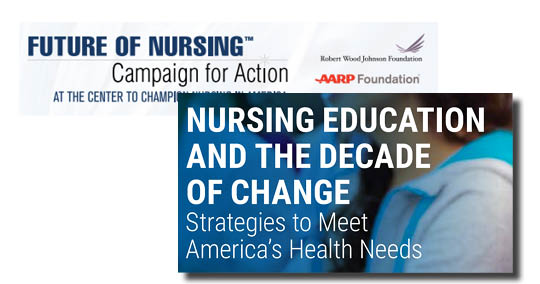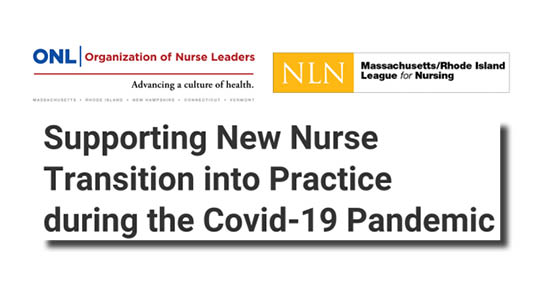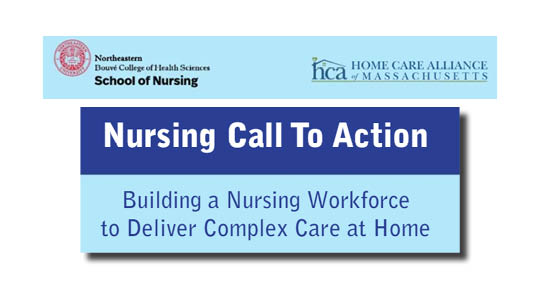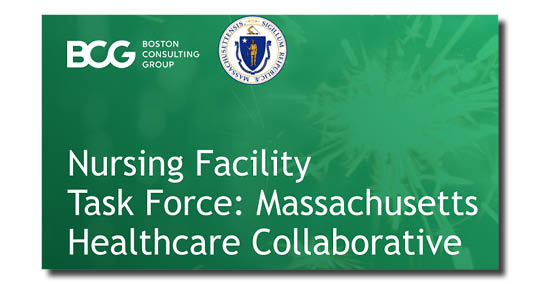The American Hospital Association’s Task Force on Workforce has released a new resource to help hospitals navigate workforce challenges and opportunities, as well as highlight strategies, resources, and case studies to assist on these pivotal efforts. Included in this resource is Section 1 focusing on Support the Team through addressing wellbeing, support behavioral health, and workplace violence prevention. Coming in the near future, will be Section 2 focusing on Data and Technology to Support the Workforce and Section 3 focusing on Building the Team.” Read more…
Author: admin
MHA Developing Healthcare Safety & Violence Prevention Programs
Massachusetts hospitals continue to be committed to the protection, health, and wellbeing of our healthcare workforce and patient populations. This includes developing policies and procedures to prevent threatening or intimidating conduct and
actual physical violence within hospitals and healthcare settings.
In response to concerns regarding increased risk of violence in healthcare settings, the Massachusetts Health and Hospital Association (MHA) formed a Workplace Safety and Violence Prevention Workgroup composed of a diverse group of hospital staff including, but not limited to, healthcare security professionals, nursing leadership, and legal counsel. The workgroup developed the following guidance to provide an understanding of the current best practices being used across Massachusetts hospitals with the goal of providing a framework for an effective healthcare violence prevention program. Such a program includes adopting a formal method for staff to report incidents of violence and for hospital management to review and analyze incidents, data, and trends to consider appropriate prevention efforts within and throughout the hospital’s properties. Finally, this guidance supports hospital adoption of internal security alert systems within the electronic medical record that will inform clinical staff and security about a patient’s previous history and potential risk for violent behavior to assist with proactive in the moment prevention efforts prior to and during an encounter with said patient.
The workgroup developed the following definition of “healthcare violence” to ensure standardization of how incidents are reported across Massachusetts healthcare settings. This definition of healthcare violence includes actions by patients, other employees, and outside visitors (interpersonal and non-interpersonal) and has been modified from the language used by the CDC National Institute for Occupational Safety and Health and the US Department of Labor.
CFTC Task Force Final Report
The Task Force’s final report of best practices and recommendations is available here.
If you are interested in learning more about this work from task force leaders, we encourage you to check out this Caring for the Caregiver webinar.
Steve Walsh, president and CEO of the Massachusetts Health & Hospital Association joins the Check Up to discuss how the industry can address clinician burnout. The interview is available here.
Nurse Staffing Think Tank: Priority Topics and Recommendations
The nurse staffing crisis has no simple fix. Research shows that optimized nurse staffing is integral to high-level patient care, better patient/family experiences and nurse well-being. Adequate investment in appropriate nurse staffing is also essential to a health care institution’s performance, reputation and financial viability. However, prevailing approaches to deploying nursing resources are not fully realizing the benefits of appropriate staffing. Read more…
The Nursing Workforce
Due to a dynamic combination of factors within the nursing workforce including an uptick in retirements, resignations, requests to reduce hours, and competitive labor markets, healthcare organizations across the Northeast are struggling to maintain a nursing workforce that supports safe, effective patient care and an engaging, secure professional environment for staff. Read more.
U.S. Dept. of Health and Human Services, 2018 National Sample Survey of Registered Nurses: Brief Summary of Results
The National Sample Survey of Registered Nurses (NSSRN) is the longest-running survey of registered nurses (RNs) in the United States. Considered the cornerstone of nursing workforce data, this comprehensive exploration provides a dynamic status of the RN population by revealing their demographics, educational attainment, licenses and certifications, and employment characteristics.
Robert Wood Johnson Foundation, AARP, Foundation Nursing Education and the Decade of Change: Strategies to Meet America’s Health Needs
Nursing Education and the Decade of Change: Strategies to Meet America’s Health Needs reports on the strides made especially in the past 10 years thanks to the Academic Progression in Nursing (APIN) program and the State Implementation Program (SIP). The Compendium is intended to be a toolkit, too, so other schools of nursing and businesses can build on what APIN and SIP have learned to expand the work.
Organization of Nurse Leaders, Massachusetts/Rhode Island League for Nursing, Supporting New Nurse Transition into Practice during the Covid-19 Pandemic: Opportunities for Academic & Practice Nurse Educator Collaboration
Information in this document can be used to guide discussions between academic and practice partners. Opportunities for collaboration between academic and practice educators to support new nurses transitioning into practice during the COVID19 pandemic are presented.
Northeastern University School of Nursing; Home Care Alliance of Massachusetts,, Nursing Call to Action: Building a Nursing Workforce to Deliver Complex Care at Home
On June 7, 2019, the Home Care Alliance of Massachusetts and the Northeastern University School of Nursing at the Bouve College of Health Sciences convened a working session entitled Nursing Call to Action: Building a Nursing Workforce to Deliver Complex Care at Home. The event brought together schools of nursing, home care agencies, and state regulators to focus on four key issues.
Commonwealth of Massachusetts, Boston Consulting Group, Massachusetts Healthcare Collaborative Kick-off
To combat HC labor shortages, Governor Charlie Baker established a Healthcare Workforce Collaborative, a multi-year private-public collaboration. The mission of the Collaborative is to close health care workforce shortages in MA to improve patient quality of care, provide new opportunities for a diverse workforce, retain pre-eminence in the industry, and fuel continued growth.

